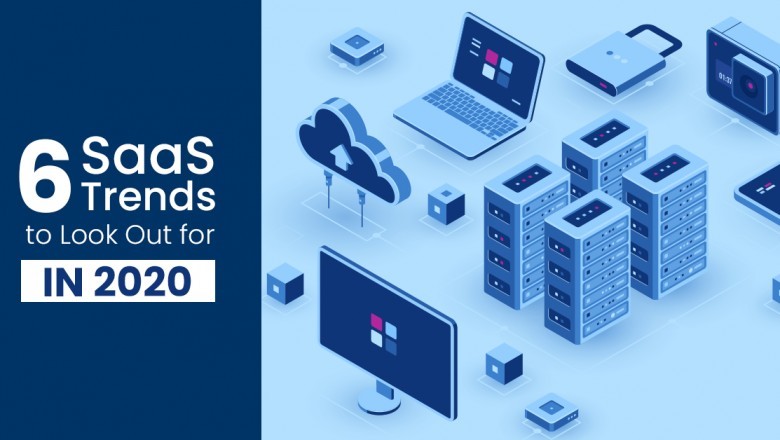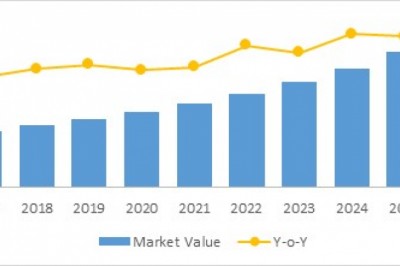views

SaaS Trends for 2020
After exploring some of the key characteristics and advantages of SaaS, it’s time to delve into the top trends that every SaaS Development Company should look out for in 2020. Some of these trends are focused on the customization of software and customer experience, while others are related to security parameters and new technologies employed in the industry.
1. Increased usage of Artificial Intelligence
The first and the most impactful trend in our list is the increased use of AI technology. We all know that Artificial intelligence is no more in the beginning stages; it has already taken the business world by storm. With the rise of emerging technologies in AI applications for various businesses, the SaaS industry has also adopted AI and machine learning algorithms for improving multiple aspects of the latest software generation.
Things that make AI an essential aspect for companies include optimizing business processes, increasing productivity and efficiency while automating repetitive tasks. Although IT experts are developing advanced AI applications, only a small portion of it has been utilized for SaaS.
There are various potential risks involved in the security of SaaS products, and AI algorithms help in recognizing these threats in the early stages so that you can eliminate them quickly. In 2020, AI might improve four different areas, which includes:
- Automation – Machine learning algorithms might be used for automating responsiveness in customer support.
- Speed – AI-powered products can speed up internal processes and operations while allowing businesses to obtain quick results related to their queries.
- Personalization – With the integration of technologies like NLP, it will become easier to use SaaS software.
- Security – With AI-enabled automation and machine learning algorithms, it will become easier to find and eliminate potential threats for SaaS products.
Considering these points, we can say that the increased use of AI will help the SaaS industry to break all the barriers.
2. Popularity in Vertical SaaS
In 2020, one of the crucial objectives for the SaaS industry is to create improved, customized, and tailor-made systems that can fulfill specific needs, and that’s where vertical SaaS can be beneficial. While Horizontal SaaS is focused on clients across every sector or industry, Vertical SaaS focuses on targeting clients with specific industries and supply chains, such as healthcare analytics software or modern logistics analytics.
It gives you the ability to customize your product according to clients’ demands while addressing customer needs within their niche. It allows businesses to collect industry-specific customer data and intelligence as well as provides a higher degree of business value for company operations and performance.
In the upcoming months, we can expect higher quality services from industry-specific vertical SaaS providers.
Change in Pricing Policy with Improved Customer Experience
Till now, we have observed a stable pricing structure in SaaS companies, but in a few months, we might see a bit of change in the pricing policy of products. Earlier, customers were needed to buy subscription plans on a monthly or annual basis, whether they need full service or only a few components. But this trend has been changing from the last few years.
As users are becoming smarter with technology, they choose to pay for what they need, hence, customers are taking recourse to SaaS services that are offered as a pay-per-use model, which allows customers to cut extra expenses with more flexibility.
With flexible pricing models, SaaS users can also expect improved customer experience, as it gives them an opportunity to spend their money wisely.
3. The Rise of Micro SaaS
We keep talking about SaaS, but have you ever thought of a smaller solution that only focuses on niche markets with a small and dedicated user base? If not, then it’s time you give it a thought.
In 2020, we might foresee the rise of Micro SaaS, which will focus on the specific requirements of users and enterprises. A Micro SaaS is a small solution that can be used to enhance the operational features of an existing SaaS product. A few examples of these tools include extensions, add-ons, and other helpful accessories. Products like Grammarly and Boomerang might find Micro SaaS very useful as an add-on.
What’s more interesting is that Micro SaaS is not developed by large enterprises; they are created by solopreneurs of nomads who want to generate passive income, which means there will also be an increasing growth of IT experts in 2020.
Another advantage of using Micro SaaS projects is their low-cost, which means anyone developing a micro project can easily accomplish it without getting outside funding. Moreover, these projects can be developed at any location while providing a higher margin.
4. Blockchain and SaaS
You might be thinking what’s the connection between blockchain and SaaS as they are two different entities. Blockchain is a revolutionary technology that has become the center of attention in bitcoin-related topics. Though it has not given a chance in the SaaS industry, it is believed that blockchain can deliver the transparency that is required in this industry.
Moreover, blockchain can also be used to build robust systems for SaaS companies while avoiding the security challenges associated with traditional databases. The benefits of implementing blockchain into companies are becoming more apparent to organizations, which might disrupt various factors of SaaS, such as online payments, tax collection, compliance, auditing, and government borrowing.
5. White Labeling in SaaS
White labeling has already become a popular trend in the industry in 2019, but it will gain more popularity in 2020. White-labeled solutions can be very beneficial to businesses, especially start-ups. For example, many small businesses often need to deal with multiple software providers to get things done, which results in overhead management time and fills paid out costs.
But, using white-labeled solutions, businesses can easily avoid these problems. Also, the tailored features and interface of white-labeled SaaS solutions help businesses save both time and money. White labeling means selling solutions developed by a different company while customizing it under your brand name.
Furthermore, many SaaS Development Services are using white labeling to channel their products. In fact, many vendors have started investing in while label partnerships rather than building new solutions to fulfill customer demands.
6. Mobile-First Approach
We have already seen multiple statistics and reports that prove mobile traffic has surpassed desktop traffic, and this gap is growing rapidly every year. A report by CNBC shows that around 72.6% of people will heavily rely on smartphones for browsing the internet by 2025. Also, according to eMarketer, the average person spends 3 hours 10 minutes per day on their smartphones.
These statistics are enough to show the impact of mobile phones on the market. As mobile technology is getting more advanced and powerful, many businesses are planning to run their businesses from their smartphones. Besides, employees feel more comfortable and empowered while working with dynamic mobile dashboards and various applications.
In a few months, more software providers will adopt the mobile-first approach to optimize their offerings with featureful mobile apps. The primary advantage of taking the mobile-first approach is that it allows SaaS companies to earn a healthy return on investment by offering a unique set of features and functionality.
Final Words
The software industry is going through intense digital transformation, as IT experts are working day and night to provide their business with maximum efficiency and profit. And the SaaS industry has gained a lot of attention in the past few years due to continuous innovation. So, if you are planning to hire SaaS Development Services, then you should stay up-to-date with the top trends mentioned above. However, if you need to avail SaaS Consulting, then you can feel free to contact Infoxen for any query related to your product development.












